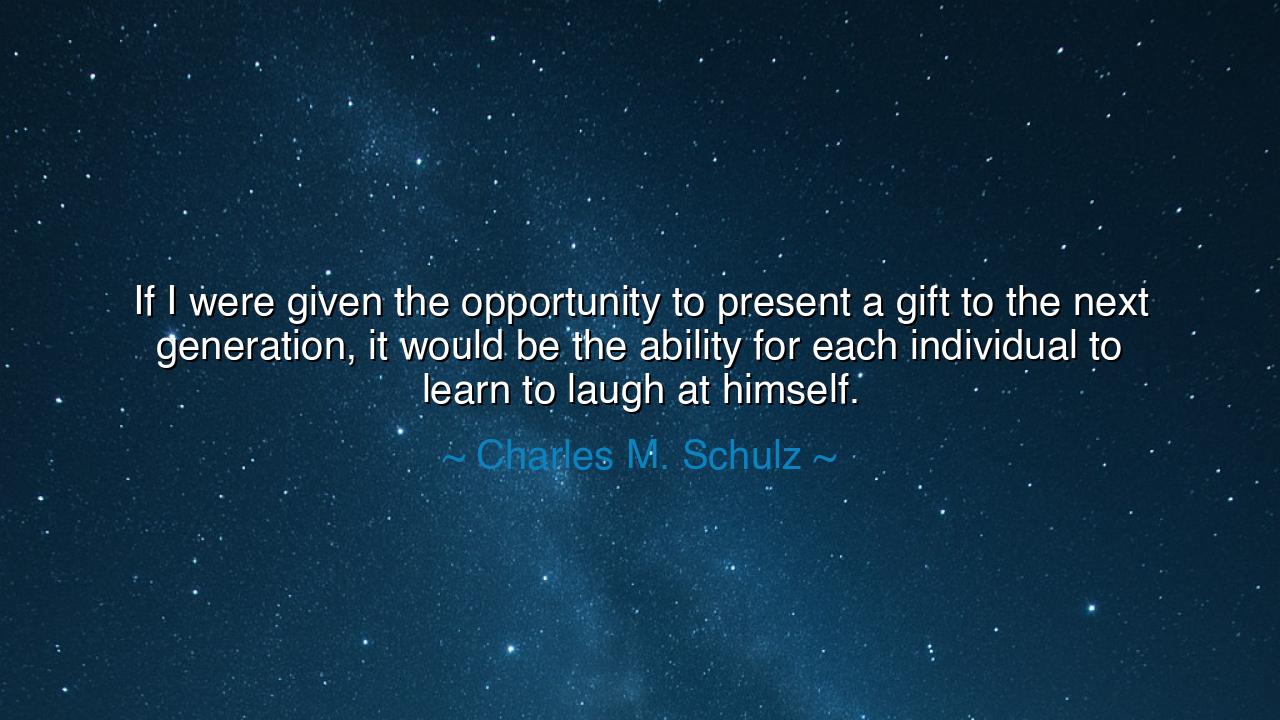
If I were given the opportunity to present a gift to the next
If I were given the opportunity to present a gift to the next generation, it would be the ability for each individual to learn to laugh at himself.






“If I were given the opportunity to present a gift to the next generation, it would be the ability for each individual to learn to laugh at himself.” — Thus spoke Charles M. Schulz, the gentle philosopher disguised as a cartoonist, the creator of Peanuts, and the father of that quiet sage, Charlie Brown. His words, clothed in simplicity, carry the wisdom of ages. For what greater gift could one give humanity than the power to laugh at oneself — to find lightness amid failure, humor amid imperfection, and peace amid the trials of living? Schulz knew that in laughter, there is liberation; in humility, there is strength. To laugh at oneself is to be free from the tyranny of ego and the chains of pride.
This quote, born from a lifetime of observation and reflection, reveals the heart of Schulz’s philosophy. Through Charlie Brown, Lucy, Snoopy, and the others, he portrayed the comedy of human striving — our endless attempts, our repeated stumbles, our small triumphs, and our foolish hopes. Yet he did not mock us; he loved us through laughter. For Schulz understood that life’s wisdom hides beneath its humor. He saw that laughter, when directed inward with kindness, softens the hard edges of disappointment and turns sorrow into understanding. To laugh at oneself is not to belittle one’s worth, but to acknowledge one’s humanity — to say, “I, too, am imperfect, and that is all right.”
To laugh at oneself is to rise above the storm of self-importance. The proud man breaks under failure, but the humble man laughs and learns. The one who can laugh at his mistakes carries no shame; he transforms them into stories, into lessons, into joy. Laughter becomes a shield against despair and a bridge toward others, for when we laugh at our own folly, we invite others to do the same, and in that shared laughter, forgiveness blooms. Schulz, who wrestled with melancholy throughout his life, knew this truth well. He turned his own struggles into art, teaching generations that even pain can be softened with a smile, that even sorrow can wear the mask of humor.
History, too, bears witness to the power of this wisdom. Consider Abraham Lincoln, whose life was steeped in loss and conflict, yet who was known for his humor and self-deprecation. Once, when accused of being two-faced during a debate, he laughed and said, “If I had two faces, do you think I’d be wearing this one?” In that single jest, he disarmed his critics, won the affection of his listeners, and revealed the strength that humility grants. His laughter did not hide his burdens; it illuminated them. Like Schulz, Lincoln understood that to laugh at oneself is to remain grounded — to refuse bitterness, to stay connected to others, and to endure hardship with grace.
There is profound courage in such laughter. It demands honesty — the willingness to see one’s flaws without fear, to admit one’s errors without shame. The one who cannot laugh at himself becomes a prisoner of pride, forever haunted by the need to appear perfect. But the one who can smile at his own missteps walks freely through the world, unburdened by pretense. In this way, humor is not mere amusement; it is wisdom in motion, the art of transforming failure into freedom. The ancients would have called it the laughter of the sage — the serenity of one who has ceased to fight against life and has learned instead to dance with it.
Schulz’s “gift” is not only emotional but deeply practical. The ability to laugh at oneself makes one resilient. When the world criticizes you, your own laughter shields you; when plans collapse, your humor rebuilds your spirit. Laughter turns pain into perspective and failure into fertilizer for growth. It teaches patience, for you cannot laugh and be angry at the same time. It teaches humility, for you cannot laugh at yourself without letting go of pride. And it teaches compassion, for once you accept your own foolishness, you are gentler toward the foolishness of others.
So, my child, take this wisdom as a sacred inheritance: learn to laugh at yourself. When you fail, laugh — and try again. When you are embarrassed, laugh — and grow. When life mocks your plans, laugh louder — and walk forward with faith. For laughter is not denial; it is transformation. It is the alchemy that turns burden into blessing, confusion into clarity, and fear into light. Seek not to be flawless; seek instead to be free.
For in the end, as Charles M. Schulz knew well, the soul that can laugh at itself is unconquerable. No insult can wound it, no failure can crush it, no sorrow can linger long in its presence. Such a soul is light, unbound, and wise — finding in life’s imperfections the divine comedy of being human. Let this be the gift you give to yourself and to those who come after you: the sacred laughter that accepts all, forgives all, and in doing so, transcends all.






AAdministratorAdministrator
Welcome, honored guests. Please leave a comment, we will respond soon